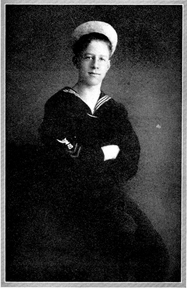In Chapter Five of Rudy Vallée’s 1930 memoir, Vagabond Dreams Come True, Rudy discusses showmanship and his limited use of it.
He also goes out of his way to poo-poo phonograph records, which he insists few people cared to listen to because there was no visual element to the experience, and predicts that television (kind of cool, no, that he was making predictions about the impact of television in 1930?) will quickly outpace radio for the same reason: visual stimulation.
SHOWMANSHIP
THE TERM showmanship is generally used with reference to someone in the theatrical or musical world but it is evident in practically every walk of life. The drugstore clerk who juggles the drinks, pouring the liquid from one glass high up to another glass lower down, is really showman. While he is trying to impress you with his cleverness he also makes the drink seem more attractive, or something that you are lucky to get if he juggles it right. Whenever someone tries, by exhibiting much physical activity, to attract attention and to captivate the admiration of others, this is showmanship; this is based on one positive fact: that the eye is about four times more efficient than the ear as a gateway to attention, memory and interest.
You have only to realize that the silent movie has been successful for many years, in fact has paid for the cathedrals that now show talking pictures, to understand the importance of satisfying the eye.
That is the reason so few people enjoy phonograph records; in fact it is really only orchestra and band musicians who are studying the parts and have only ear interest to be satisfied, that can sit and listen with complete attention to phonograph records.
This is one of the reasons that the makers of radio programs have the devil’s own time to keep the interest of their listeners: because there is no band or speaker to see, attention lags if the program becomes at all dull. Unquestionably television will add greatly to the attraction of the radio, because people must see that which is giving them something for the ear. That is why an attractive vocalist, either man or woman, with beauty of face or figure or eccentricity of pose and delivery will be twice as successful as a homely one with twice the vocal or speech-making ability.
Ted Lewis, to my mind, is the greatest showman in the theatrical game. He will tell you himself that from the standards of artistry he is not a great saxophonist or clarinetist, nor does he claim to have a beautiful voice. But he holds me and thousands of others actually spellbound by his inimitable wizardry of presentation. No one could sell his band, his number or himself in quite the same way as this magical fun-maker can. It is hard to say just what feature or features are most responsible for his success; perhaps it is just his joviality, or the pathos of his voice, or the fact that he is always on the move, juggling his hat and cane, and injecting into his act little comedy bits and byplays with the members of his orchestra. He has made a fortune and he can thank one thing, the fact that he was born with more sense of showmanship than a score of average men would have. I can think of dozens of others but none of them so well-known and quite so clearly a good example as the high-hatted tragedian of song.
Sometimes showmanship is used as a cloak to prevent the exposé of a great weakness. Many a trombonist, whose lips cannot produce the tone, makes up for the lack of what should be coming out of the end of the horn in actual music, by grandiose motions of his arm as he moves the slide, thereby earning the title among musicians of “Joe Motion,” meaning that he is only good for motion to conceal the fact that he is really unable to play his instrument. Likewise many another instrumentalist has secured an engagement and become a big hit in the eyes of his public by elaborate, graceful or even awkward motions and contortions that so catch and impress the eye that his weak musical delivery is forgotten. You yourself can probably recall the obvious and concrete example of the beautiful girl with no voice who becomes a tremendous sensation, or at least very popular, in musical comedy, admittedly due to the silent showmanship of the beauty.
I suppose the same trick of delighting the eye is responsible for the great popularity that eccentric dancing, of the type that one sees between the episodes of a musical comedy, is so popular. There is nothing that will bring great applause so completely as a dancer who knows some odd and hard steps. The eye seems to be so impressed with the unusual physical exertion that the hands feel they must applaud loudly.

